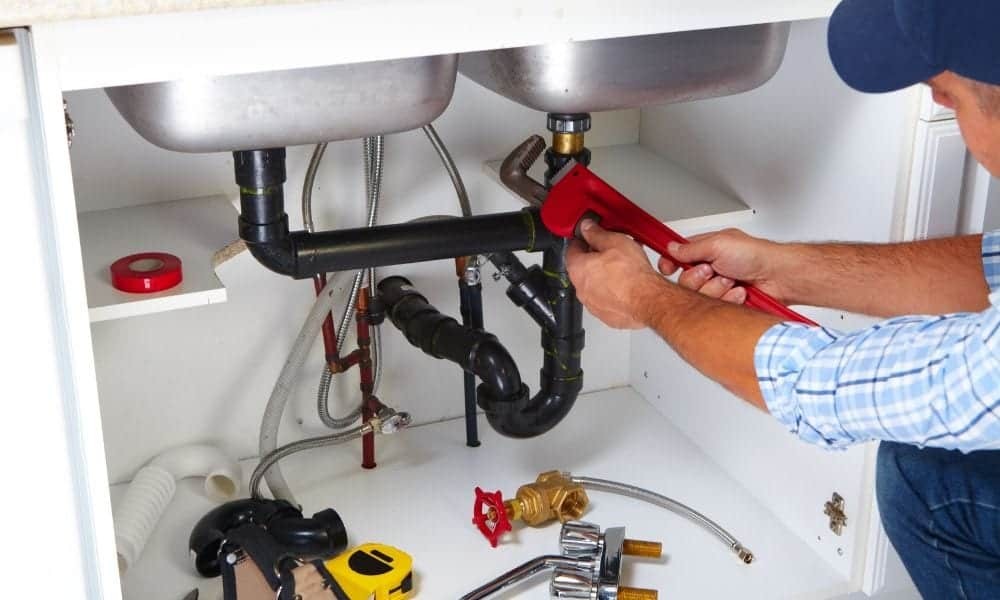1. Use Stainless Steel Hoses for Washing Machines
Rubber hoses can crack or burst over time. Replace them with stainless steel hoses, which are stronger and last longer.
2. Never Pour Grease Down the Drain
Grease hardens and clogs your pipes. Let it cool down, then dispose of it in the trash. Use a sink strainer to catch food scraps and prevent blockages.
3. Know Where the Main Water Shut-Off Valve Is
In an emergency, shutting off the main valve quickly can prevent serious water damage. It’s usually near where the water enters your home. Show everyone in your house how to use it.
4. Avoid Drilling Into Pipes
Before drilling into walls, use a stud finder to avoid hidden pipes. This prevents accidental damage and leaks.
5. Test for Toilet Leaks with Food Coloring
Put a few drops in your toilet tank. If color appears in the bowl without flushing, a Plumbing Bedford expert can help identify and fix the leak. Fixing this can save thousands of gallons of water each year.
6. Use Drain Guards
Install drain guards in sinks and showers. They catch hair and food, helping to prevent clogs and keeping water flowing freely.
7. Clean with Vinegar
Hard water stains on faucets and showerheads can be cleaned with vinegar. Soak the parts in vinegar overnight, scrub, rinse, and reattach.
8. Check Your Water Pressure
High water pressure can damage pipes. Use a pressure gauge (found at hardware stores). If it’s over 85 psi, consider a pressure-reducing valve.
9. Fix Leaky Faucets and Toilets
A dripping faucet or running toilet wastes a lot of water. Replacing worn-out washers, flappers, or valves can save money and prevent water damage.
10. Use a Shop Vac for Clogs
For small clogs, a wet-dry shop vac can help. It sucks out blockages without damaging pipes.
11. Don’t Use Chemical Drain Cleaners
These can harm your pipes. Instead, use a plunger, drain snake, or a mix of baking soda and vinegar.
12. Switch to PVC Pipes
PVC is strong, lightweight, and won’t corrode. It’s easy to install and lasts a long time.
13. Sharpen Disposal Blades with Ice
Run ice cubes through your garbage disposal monthly. It sharpens blades and clears grime.
14. Prepare for Plumbing Projects
Before turning off your water, fill buckets for flushing toilets and washing hands.
15. Keep Drains Clean
Clear hair and soap from bathtub and shower drains regularly to stop clogs.
16. Install a Water Softener
Soft water prevents mineral buildup and protects plumbing and appliances.
17. Consider Upgrading to PEX Pipes
PEX pipes are flexible, resist freezing, and are easy to install. They’re a great long-term upgrade.
18. Maintain Your Water Heater
Flush it every 1–2 years to remove sediment. Check the anode rod and pressure valve yearly.
19. Freshen Drains Naturally
Pour baking soda and hot water down drains to fight bad smells.
20. Don’t Flush Wipes
Even “flushable” wipes can clog pipes. Only flush toilet paper and waste.
21. Take Plumbing Photos During Renovations
Snap pictures of exposed pipes for future reference. It helps with repairs or updates later.
22. Winterize Outdoor Plumbing
Disconnect hoses and cover outside faucets. Let indoor faucets drip slightly in freezing weather.

